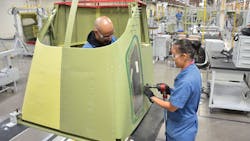2014 IW Best Plants Winner: Cessna Mexico’s Flight Plan -- Attack the Processes
"Never attack people, attack the process." Ruben Favela, continuous improvement senior manager at Cessna Mexico, shares this notion as he leads a visitor (me) on a tour through the aircraft manufacturer’s facilities in Chihuahua.
That philosophy isn’t revolutionary. Many people even would say the idea conveyed by those words is the underpinning of sustainable manufacturing excellence. Frequently, however, the words are more easily said than done.
That’s not the case at Cessna Mexico. The organization has completed more than 250 kaizens, "solving critical problems in complex processes," according to its IndustryWeek Best Plants application.
At A GlanceCessna Mexico Chihuahua, Chihuahua, Mexico Employees: 846, non-union Total square footage: Primary Products: Start-up: 2006 Achievements: 55% reduction in manufacturing cycle time in past 3 years; 94% on-time delivery to customer request date; 99.7% reduction in customer reject rate in past 3 years |
Moreover, the evidence of Cessna’s efforts is readily apparent throughout the multiple locations and 631,000 square feet of manufacturing space that comprise the Cessna campus.
Take the "autonomated" manufacturing sequencer in the sheet metal assembly area, for example. Favela points to this process innovation as one of the many that contribute to Cessna Mexico’s exceptional quality results. The sequencer looks a bit like the skeleton of a boat, but in fact it is a "smart" tooling jig that is able to detect whether an operator is following the proper manufacturing sequence. The number of steps and components required in an assembly can be significant.
If the correct assembly sequence is not adhered to, the jig shuts down the air that powers the tools and sends a visual signal to indicate where a fix is needed. Implementation of these "smart" tooling jigs, which have been replicated in well over half of the big tooling jigs, has significantly reduced errors in these processes.
In a second example, two teams collaborated to streamline a machining operation that had for many years required the use of three separate pieces of equipment -- with three different setups, inventory requirements and associated quirks. The teams developed a solution that reduced the number of required machines from three to one by developing unique tooling able to perform trimming, molding and perforation processes.
Simplifying the machining process not only improved the cycle time through the operation, but it lowered the required inventory levels and improved safety for the operator.
Such innovations in processes are occurring everywhere, in sheet metal assembly, fabrication, in wire harness assembly and in composite parts manufacturing. Moreover, a significant amount of the work done in Cessna Mexico is manual or done with the help of machines, but it is not full automation. That means giving the workforce the tools they need to succeed is important, Favela says. "We are continually working with our workforce," he says. "We want them to know '[we] are going to take care of you so that you can be successful.’"
The philosophy clearly is working for Cessna Mexico. The facility has near perfect first-pass quality yield, a sharp decline in scrap and rework costs, and a total recordable injury rate of zero in 2013.
About the Author
Jill Jusko
Bio: Jill Jusko is executive editor for IndustryWeek. She has been writing about manufacturing operations leadership for more than 20 years. Her coverage spotlights companies that are in pursuit of world-class results in quality, productivity, cost and other benchmarks by implementing the latest continuous improvement and lean/Six-Sigma strategies. Jill also coordinates IndustryWeek’s Best Plants Awards Program, which annually salutes the leading manufacturing facilities in North America.
Have a story idea? Send it to [email protected].

